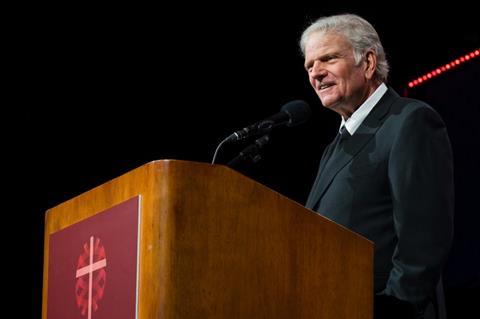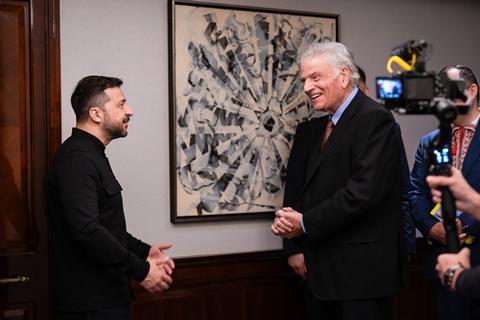Reporting from Berlin, where 1,000 Christian leaders have gathered for an invitation-only congress on evangelism, Emma Fowle addresses Franklin Graham’s latest outspoken remarks and explores the place of proclamation evangelism amid a claimed quiet revival

Much of the talk around what God is currently doing – whether at universities in the US or the UK’s so-called ‘quiet revival’ - has focussed on something new. Students leading spontaneous worship without platform or prominent leader; young people queuing to get into all night prayer meetings and churches reporting young men arriving unbidden, having watched Jordan Peterson alone in their bedroom.
Against this backdrop, one might wonder if proclamation evangelism has become old fashioned. Whether the days of Billy Graham preaching to packed stadiums and reaching an estimated 215 million people in over 85 countries are long gone. With religion trending on TikTok and many younger people coming to faith without the traditional altar calls that Graham was famed for, perhaps we’re now living in a different era.
Is there still a place for proclomational preaching at enormous evangelistic events?
It was with this question in mind that I headed to Berlin for the Billy Graham Evangelical Association (BGEA) European Congress on Evangelism. It gathered together 1,000 leaders and evangelists from 55 countries and territories around Europe for a free, invitation-only event, which was convened by Rev Franklin Graham, Billy’s son and the current head of BGEA.
Uncompromising
When Rev Graham took to the stage on the first night, he said the Church had become “confused” – particularly on areas of morality and sexuality. Pastors had been “seduced” into preaching a more palatable gospel and in the process had lost the power and authority that comes from standing firmly on the word of God.
“How do we evangelise a world that is becoming more antagonistic towards the gospel?” asked Franklin, before emphatically answering his own question: “Don’t be ashamed of the gospel. Declare it! Proclaim it! Shout it! There is Holy Spirit-filled power when we preach it.”
It was a clear challenge to all those present. “If we’re going to reach Europe, we’re going to need an army, an army of evangelists - unafraid, unashamed, unapologetic, uncompromising - standing firmly on the word of God,” he continued.
Franklin’s outspoken stance on issues of gender and sexuality, as well as his association with US President Donald Trump and his love of militaristic-sounding language mean he’s something of a marmite figure. But to this group of fellow evangelists in Berlin, he received a rapturous response. For all those who criticise him, there are many who would hold that his message of unapologetic trust in the word of God is what the Church desperately needs.

The conference itself was a sight to behold. No expense had been spared in looking after delegates at the JW Marriott hotel, with the best of American hospitality on display.
Franklin Graham said his prayer was that the event would “renew the priority of proclamation evangelism for the church in Europe.” A noble and ostensibly broad aim, but the delivery was undeniably conservative evangelical in style.
There was also much talk of the reaching next generation, but barely anyone under the age of 50 actually on the stage.
The only two women on the programme (Christian apologist Dr Amy Orr-Ewing and Finnish politician Päivi Räsänen) were pointedly billed as ‘interviewees’ rather than speakers in their own right. This was uncomfortable - and perhaps even a little disingenuous. If conference organisers felt delegates would benefit from the wisdom and intellect of these women, then why not give them equal billing to their male colleagues?
In her interview with Cissie Graham Lynch (Franklin Graham’s daughter), Dr Orr-Ewing responded to the rumours of a ‘quiet revival’. When asked if people’s attitude to the gospel had changed, she replied with an emphatic ”Yes”. In all her 25 years of ministry experience, she said she had “never known an openness like this.”
“It really is a holy moment,” she added to rapturous applause.
So which is it? Is the world more antagonistic, as Franklin Graham suggested in his opening speech? Or are people more open to the gospel than ever before?
This tension was further evidenced when the Finnish MP, Päivi Räsänen was also interviewed by Cissie. Räsänen has been fighting a six-year legal battle that could result in her imprisonment. Her crime? Sharing a Bible verse on social media in criticism of the Church’s support of gay pride month. And yet Räsänen also claimed a quiet revival was taking place in Finland, where, much like the UK, young men in particular are increasingly turning back to Christ.
Both challenge and opportunity can co-exist, even if they seem on first glance to be in opposition to one another. While younger people may be more spiritually open, it is still the older generations who hold much of the power when it comes to the state, law and government. While some are more open to the gospel, in other places, Christians are finding it more challenging than ever to openly share their beliefs.

In the same way, perhaps it is not so much a case of either/or when it comes to a quiet Gen Z revival or the old school proclamation evangelism that BGEA are rooted in. Some people will find God on the internet. Many have – and will continue – to find him at a BGEA-style rally. Just two months ago, Franklin Graham preached to his biggest crowd ever – 430,000 people over two days heard the good news of Jesus from a massive stage in the Ethiopian capital of Addis Ababa. Thousands made decisions for Christ.
He will be hoping for similar results, when his God Loves You Tour comes back to London later this month.
Franklin’s style might not be everyone’s cup of tea, but it is undeniably effective. And with so many people still to be reached with the gospel, much needed.
Same, same but different
The gathering in Germany came 59 years after Billy Graham himself held a similar event in 1966. Back then, the world was still reconstructing itself after the horrors of the second world war and Berlin was a deeply divided city.

Today, war rages just one country away in Ukraine. In the German capital, the streets around the hotel swarmed with tanks and police vans as the Ukranian leader Volodymyr Zelensky met with German chancellor Friedrich Merz nearby. That evening, Franklin Graham revealed that he’d also met with President Zelensky that day – and, unsurprisingly, took the opportunity to pray for him, as well as for an end to the conflict.
We stood together as a congress and echoed that prayer – 1,000 leaders from across the continent, united in our petition for peace. The next day, Dr David Karcha, a Ukrainian evangelist told the gathered audience: “In a time of peace, the gospel is powerful. But in a time of war, it is unstoppable.”
“In the world’s eyes, Ukraine is a story of war. But in God’s eyes, it is a story of revival, a story that reminds us all that the Gospel advances. That even when the rockets are exploding next to us, the foundation of Christ stands firm. That even in the darkest night, the light of his truth still breaks.”
It was a moving moment.
Not ashamed
Despite some misgivings about the tone and style, the lack of women and young people on the stage, there is much to applaud in BGEA’s commitment to bringing the Church together, investing in leaders and their uncompromising approach to the gospel.
It is easy to lob criticism from the sidelines, but there are precious few who have Franklin’s track record, the desire or the resources to do what he does.
Some may find God on the internet - although the latest research from the Evangelical Alliance, showed that only four per cent of new Christians said social media prompted them to start exploring faith. Every other category, including ‘I was looking for meaning’ and ‘A Christian friend spoke to me’ ranked far higher (34 per cent and 29 per cent respectively).
But here will always be a need for the gospel to be communicated in as many ways as possible. Whatever our preferred method, Franklin’s exhortation to clearly preach the good news, without compromise or change, is needed.
As the conference host Dr David Bruce put it so well on the final morning: “Much has changed in 59 years. But one thing remains the same: the world needs the gospel as much now as it did then.”
And to that, I can offer a hearty “Amen!”






































2 Readers' comments